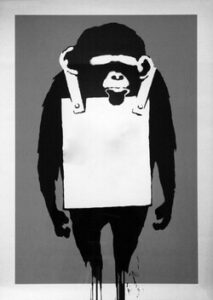EUTM 17981629 in the name of Pest Control Office Limited
In May 2021, the Cancellation Division of the EUIPO declared the registration of Banksy’s Monkey image invalid on grounds of bad faith. The trademark owner appealed and on 25 October 2022, the Fifth Board annulled the decision and refused the cancellation action, ruling not only on (absence of) bad faith but also distinctiveness and descriptiveness, which the Cancellation Division had not considered.
Full Colour Black Limited, the Cancellation applicant, is a London based greeting card company that defines itself as “a contemporary Art Licensing company specialising in the commercialisation of world famous street art” (here). It has an interest in getting its hands on the art for free. Banksy artwork appears an easy target: Banksy makes his artwork available online and expressly allows free downloading – however with the explicit exception of commercial purposes. Moreover, Banksy’s identity is unrevealed, which causes difficulties in enforcing copyright claims against unauthorized use.
Through the entity “Pest Control Office Limited”, Banksy registered 15 EUTMs for select pieces of art. Full Colour Black brought invalidity proceedings against no less than 7 of these. In 6 cases, the Cancellation Division cancelled the marks finding that they had been filed in bad faith. One case is suspended (concerning the re-filed ‘Flower Thrower’) and in only one of the 6 cases, namely the one discussed here, Pest Control appealed – and successfully so.
The Cancellation Division considered that Banksy never had any intention to use the marks as trademarks but only registered them to keep others from using them. The marks had been filed merely to circumvent the limitations of copyright law. The opening, in 2019, of a shop (or rather, a shop window) with Banksy merchandise, expressly made to put the trademarks to use, was taken as an admission that the artist had no real intention to use the artwork to indicate origin. The artist’s statement “copyright is for losers” was interpreted as revealing a negative attitude towards IP. Moreover, based on the invalidity applicant’s submission, that merchandise with Banksy artwork was assumed to be by and large ubiquitous and Banksy had done nothing to prevent that.
The Board of Appeal saw this all very differently. For starters, it did not consider massive third-party commercial use of Banksy art to have been proven, apart from that being less a question of bad faith than distinctiveness.
The Board emphasized that it was perfectly possible to protect the same artwork or sign through both copyright and trademark law. The mere fact that copyright protection presents difficulties and is limited in time does not make trademark protection abusive. [N.B., considering that copyright lasts 70 years beyond the death of the author, to conclude bad faith on the author’s part because this duration is extended seems far-fetched].
It may well be that the trademarks were registered to keep others from using the signs. However, that is the normal aim of trademark registration, and does not amount to bad faith – at least when the applicant is the legitimate owner!
In considering whether use of the trademark as such was intended, the Board highlighted that the cancellation action was brought half a year into the five-year grace period. A trademark owner is free to choose when to start using newly registered marks, and the circumstances overall did not allow the assumption that there was never an intention of using the marks, or allowing (legitimate) third parties to use them as licensees.
Finally, to base any conclusions on Banksy’s statement “copyright is for losers”, and to take that as supporting a finding of bad faith, contravenes the fundamental right of freedom of expression.
As stated, Full Colour Black has manifest financial interests, which presumably outweigh by far the legal costs incurred by attacking Banksy’s trademark registrations. It is yet to be seen if they take this case to Luxembourg. One would hope that the Board’s well-balanced approach would prevail, because who laughs last laughs best!
_____________________________
To make sure you do not miss out on regular updates from the Kluwer Trademark Blog, please subscribe here.



